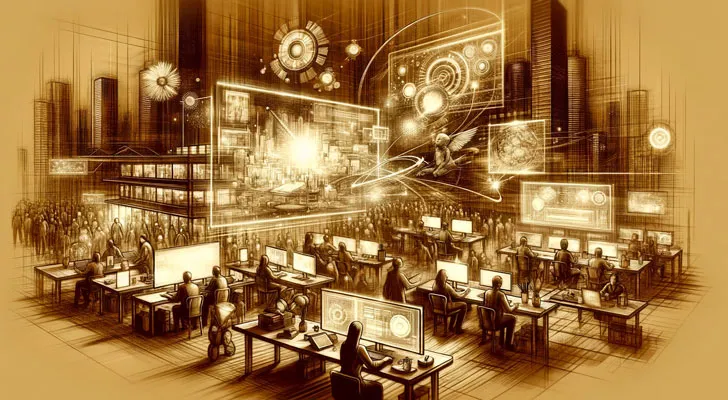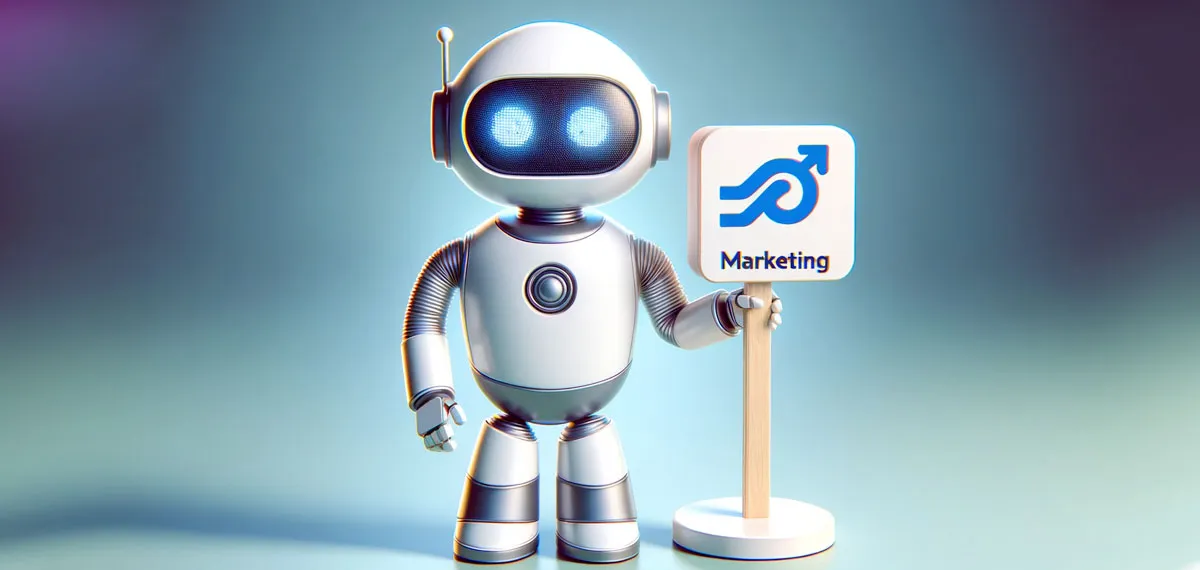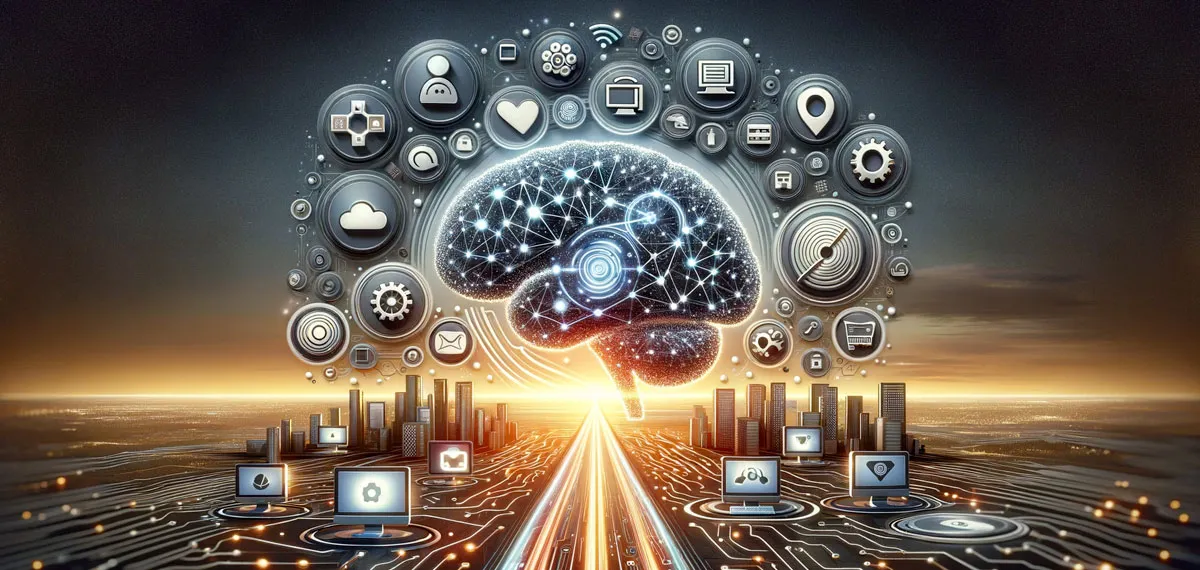Artificial Intelligence (AI) is increasingly becoming a cornerstone in the evolution of content creation, fundamentally transforming how we produce, manage, and distribute content across various platforms. This technological revolution is not just automating mundane tasks but is also fostering new ways to engage with content that were previously unimaginable. From algorithms that can write articles to systems that personalize content for individual users, AI is breaking traditional boundaries and setting new standards. It enables content creators to harness more complex tools, pushing the envelope of creativity and efficiency, and offering audiences more tailored and immersive experiences. As we step further into the digital age, AI’s role in content creation is not only innovative but also indispensable, redefining the landscape of media and communication.
AI-Driven Writing and Editing
The advent of AI in the realm of writing and editing marks a significant shift towards more dynamic and efficient content creation. AI-driven tools are now playing a pivotal role in the content industry, enhancing the capabilities of writers and editors by automating routine tasks, offering real-time suggestions, and improving the overall quality and coherence of written material. AI writing assistants, such as OpenAI's GPT-3, have revolutionized how content is generated. These tools are capable of producing full-length articles, crafting creative prose, and even authoring technical papers that are indistinguishable from those written by humans. Their ability to analyze vast amounts of data and generate content based on patterns learned from that data makes them invaluable for businesses seeking to scale up their content production without compromising on quality.
AI tools help maintain a steady flow of content, enabling bloggers to publish more frequently while maintaining a high standard of writing. AI assists in drafting initial versions of posts, suggesting headings, and optimizing content for SEO, which allows writers to focus more on the creative aspects of content creation. Furthermore, AI-driven editing tools can improve grammar, check for plagiarism, and ensure the stylistic consistency of the text, enhancing the reader’s experience. For journalism and media, AI's impact extends to speeding up reporting, especially in breaking news situations. AI systems can quickly gather facts, draft news summaries, and even help journalists by suggesting potential sources and citations. This not only accelerates the writing process but also aids in delivering accurate, reliable news content under tight deadlines.

The publishing industry also benefits from AI, particularly in the editing of books and longer manuscripts. AI tools streamline the editing process by catching more subtle grammatical nuances, suggesting better word choices, and even helping to maintain the author's tone throughout the text. For fiction writers, AI can propose plot developments or character traits based on the narrative's existing direction, adding a layer of depth and creativity.
Content Personalization Through AI
Artificial Intelligence (AI) has dramatically reshaped how content is tailored to individual preferences, thereby significantly enhancing user engagement and satisfaction. Through sophisticated algorithms, AI analyzes reader data such as browsing habits, interaction history, and even device usage to create a highly customized content experience for each user. This process not only improves relevance but also deepens the user's connection to the content, encouraging longer engagement times and more frequent visits.
One of the powerful ways AI achieves this is through adaptive content recommendation systems. These systems use machine learning models to predict and suggest content that aligns with an individual's interests and previous interactions. For instance, if a user frequently reads articles on technology and digital trends, the AI system will prioritize similar topics and even suggest related articles on emerging technologies or innovation news.

AI in Visual Content Creation
Artificial Intelligence (AI) is revolutionizing the field of visual content creation, using advanced deep learning techniques to generate and edit images and videos. These AI systems can create visual content from scratch, mimicking the style of specific artists or generating entirely new concepts. This capability is particularly transformative in the marketing, entertainment, and media industries, where the demand for innovative and engaging visual content is continuously rising. For marketers, AI-driven visuals can tailor content to consumer preferences at scale, enhancing engagement and personalization. In entertainment, AI enhances visual effects and animation, allowing for more creative storytelling. The media industry benefits from AI's ability to quickly produce high-quality visual content, significantly reducing production times and costs while increasing output. This technology not only streamlines workflows but also opens up new possibilities for creative expression and audience interaction.
The Role of AI in Content Curation and Management
AI systems significantly streamline the curation and management of large volumes of content, which is essential for businesses aiming to deliver tailored information to the right audience efficiently. Through machine learning algorithms, AI can analyze user behavior, preferences, and engagement to dynamically curate content that matches the audience's needs. This technology ensures that viewers receive content that is most relevant to them, enhancing user experience and engagement. AI also revolutionizes content discovery platforms by improving the accuracy of search results and recommendations, making it easier for users to find the content they desire quickly. This capability not only enhances user satisfaction but also increases content consumption and loyalty, providing businesses with critical advantages in today's information-saturated market.

Automation of Content Distribution
AI technology significantly enhances the efficiency of content distribution across multiple channels by automating scheduling and placement, ensuring content reaches the widest possible audience at optimal times. AI-driven tools analyze viewer habits and preferences, enabling them to determine the best times for content delivery. This ensures maximum engagement by aligning content availability with audience online activity peaks. Such tools not only optimize content reach but also streamline marketing efforts, allowing for real-time adjustments based on audience interaction data. This level of automation in content distribution is crucial for maintaining relevance in the fast-paced digital media landscape.
Ethical Considerations and Challenges
The integration of AI in content creation raises several ethical concerns that need careful consideration. Key among these is the issue of authenticity, where AI-generated content may blur the lines between genuine human creativity and machine-generated output. Copyright concerns are also significant, as the use of AI could inadvertently lead to the replication of copyrighted material without proper attribution. Additionally, the reliance on AI poses risks to employment, potentially displacing jobs in content creation sectors. Another critical challenge is ensuring that AI-generated content remains unbiased and factually accurate. This requires constant oversight and updates to the AI systems to maintain integrity and trustworthiness in the content they produce. These ethical and practical challenges necessitate a balanced approach to AI utilization in content creation, ensuring innovation does not overshadow ethical responsibility.

Conclusion
Throughout this exploration of AI's role in content creation, we've seen how it is reshaping the landscape, from writing and editing to visual content production and distribution. AI's capabilities in personalizing content to match individual user preferences and automating distribution ensure that content not only reaches the right audience at the right time but also resonates on a more personal level. However, as we harness these powerful tools, we must also address significant ethical considerations, including concerns about authenticity, copyright issues, and the impact on employment. Maintaining human oversight is crucial to ensure that the content remains unbiased, factually accurate, and true to ethical standards. This balanced approach will be key to successfully integrating AI in creative processes, ensuring that AI serves as a complement to human creativity rather than a replacement. By navigating these challenges thoughtfully, we can leverage AI to its fullest potential, enhancing the creativity and effectiveness of content creation in the digital age.





